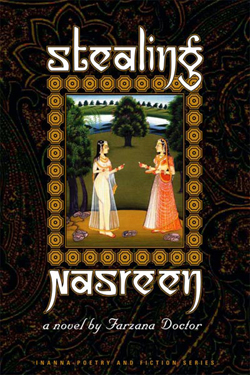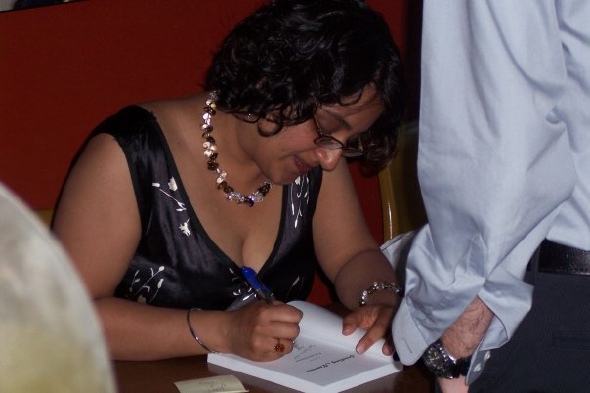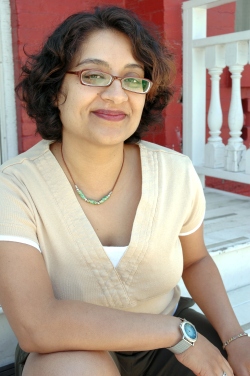
Farzana Doctor: Stealing Nasreen
When I first heard about the unusual premise of Farzana Doctor's Stealing Nasreen (Inanna Publications), I was immediately intrigued: set in Toronto, the story focuses on an Indo-Canadian lesbian and burnt-out psychologist who becomes enmeshed in the lives of a new immigrant family from Mumbai.
I loved this book, which I found to be an irresistible combination of mystery, desire, and wry humour, woven together in the complexity of human relationships. The book also gave me an enlightening glimpse of the immigrant experience as well as another culture and lifestyle.
More about Farzana Doctor, the South Asian queer community, and how Stealing Nasreen got published beyond the jump.
How was the launch of Stealing Nasreen?
The launch was a blast. We were at the very lovely Trane Studio, which holds about 125 people and there was standing room only. I had a wonderful MC, Anjula Gogia (who works for PEN Canada) and two friends acted as the silent but magical "raani" and "servant" from the novel's front cover. The Toronto Women's Bookstore co-hosted along with my publisher, Inanna. It was one of the best nights of my life.

I see from your blog that you were at the Dyke March in San Francisco. How do the Pride celebrations in SF compare to the ones in Toronto?
Well, there were lots of similarities in terms of spirit and energy. The main difference that I noticed were in the numbers of people. SF Pride is HUGE. SF is known for being North America's gay mecca, and during Pride lots of queer visitors arrive to participate. So the Dyke March was much bigger than in Toronto and so was the Pride Parade. I was also impressed to see that SF Pride holds a Trans March during the weekend, something that Toronto doesn't have yet.
I was lucky enough to be able to attend the DesiDyke Brunch, which was organized by Trikone while I was there. That was a special treat--being able to meet 40-50 South Asian queer women at once, many of whom I've "seen" online through the DesiDyke Yahoo listserv I am on. This felt like a uniquely SF experience--again, because of the numbers.
What inspired you to write Stealing Nasreen?
About 7 years ago, I took a U of T Continuing Ed class called "Writing the Novel", taught by Ray Robertson. In that class, each student had to write something that would be critiqued by the rest of the class. I wrote the first draft of the first chapter of Stealing Nasreen for that assignment.
Also, there was a growing awareness of issues relating to underemployed immigrants. That helped me write Shaffiq's character. I was also really interested in writing immigrant and queer characters because I feel that there aren't enough novels on this topic.

How did the U of T class critique go? How much has the chapter changed since that class?
It was quite mixed, as were the skills and talents of the students in the classroom. I recall feeling encouraged to write more and so I did...and then I had more and more pages. The chapter changed quite a lot over the years (it took 4 years to finish) as my writing abilities grew. The best piece of advice I got was from Ray Robertson himself. He talked about how it is possible to write a novel while working full-time, in three 45 minute sessions per week. That was what I aimed for, and three years later it was done.
How much outlining did you do before you started writing?
Actually very little. It was more of an organic process where the story just kept developing. It was only in the revision/editing stages that I went back and tracked the outline and moved things around to ensure consistency.

How much of "Stealing Nasreen" was based on your own experiences?
The novel is a work of fiction. However, when I first began writing, I followed that old piece of advice to try to start with something you know. So I created a frame that was familiar (South Asian lesbian therapist) and leapt from there to create Nasreen. Besides being a South Asian lesbian therapist, we have little else in common. That said, various small threads of experience (mine and other people in my circle) have found their way in in some of the details.
How did you find a publisher?
It took 2 years, and many many rejection letters. Then, about 2 years ago, I heard about Inanna, because a friend was being published by them. I sent in my manuscript and the rest is history.
Do you find that being a therapist helps your writing? And vice versa?
I find that being a therapist helps to the extent that you have to be a good observer of people to be a good writer. Also, as a person and a therapist, I am very interested in people's emotional processes, which probably helps the writing. Being a writer helps me create balance in my life, which is necessary for a therapist.
Where does the name of your blog ("Blogwala") come from?
I am Bohra (a subsect of the Shia Muslim sect) and Blogwala is a play on the popular suffix to Bohra names. Bohras are known historically for being part of the merchant class, and "wala" often means "seller of". So there are lots of people named like Shaffiq "Paperwala" or "Cutlerywala".
I understand you're working on another novel. How is that coming? What is it about?
It's going well. I'm 1/3 through a first draft. The next novel is about a man who makes a really huge mistake that changes his life and the novel picks up the story 20 years later.
You can find out more about Farzana at Farzanadoctor.com or at her blog, Blogwala, where you can also see her upcoming reading schedule.
PHOTO CREDITS:
Photo #1 (Farzana, headshot)- Judith Nicholson
Photo #2 (booksigning) - Brian Cartwright
Photo #3 (Farzana, seated on porch)- Nicola Betts
Latest Videos
Latest Videos
Join the conversation Load comments







